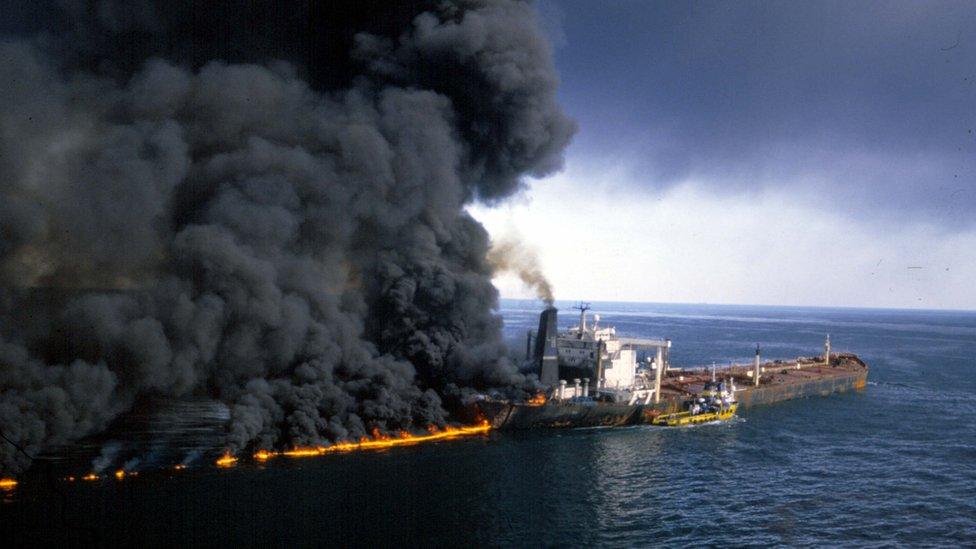Tanker seizure: Jeremy Hunt warns Iran against choosing 'dangerous path'
- Published
Jeremy Hunt warns of "serious consequences" for Iran
Foreign Secretary Jeremy Hunt has expressed his "extreme disappointment" in a phone call with his Iranian counterpart following the seizure of a British-flagged tanker in the Gulf.
It comes after Mr Hunt warned Iran may be choosing a "dangerous path" of "illegal and destabilising" behaviour.
The Stena Impero's owners have been unable to contact the ship, which was surrounded in the Strait of Hormuz.
Iran said the vessel was "violating international maritime rules".
In the call, Iranian Foreign Minister Mohammad Javad Zarif told Mr Hunt the ship must now go through a legal process, according to the Iranian news agency ISNA.
A second British-owned Liberian-flagged tanker, the MV Mesdar, was also boarded by armed guards but was released on Friday.
What happened?
The Stena Impero was seized by the Iranian Revolutionary Guard on Friday in a key waterway in the Gulf.
The tanker was surrounded by four vessels and a helicopter before heading into Iranian waters, Mr Hunt said.
"We are not looking at military options," he said. "We are looking at a diplomatic way to resolve this situation."
A senior Iranian diplomat was summoned to the Foreign Office in London following the ship's seizure.
Mr Hunt confirmed he had spoken to his Iranian counterpart on Saturday afternoon.
He said he expressed "extreme disappointment that having assured me last Saturday Iran wanted to de-escalate the situation they have behaved in the opposite way."
He also tweeted: "Yesterday's action in Gulf shows worrying signs Iran may be choosing a dangerous path of illegal and destabilising behaviour after Gibraltar's legal detention of oil bound for Syria."
Labour leader Jeremy Corbyn has also demanded the release of the tanker and its crew, urging all sides to "show restraint".
He added in a tweet: "Trump tearing up the Iran nuclear deal has fuelled confrontation."
Another emergency Cobra committee meeting is due to be held later.
Iran's state-run IRNA news agency said the tanker was seized after it collided with a fishing boat and failed to respond to calls from the smaller craft.
The vessel's owners said it was fully complying with regulations and was in international waters when it was approached.
Stena Bulk said the 23 crew members, who are Indian, Russian, Latvian and Filipino, were in good health.
It said it was preparing a formal request to visit those onboard the seized ship.
A UK government spokeswoman told the BBC: "We have advised UK shipping to stay out of the area for an interim period."
What does Iran say?
Iran's foreign minister Javad Zarif tweeted, external that the UK "must cease being an accessory to #EconomicTerrorism of the US".
He said it was Iran that guarantees the security of the Gulf and the Strait of Hormuz.
Why does the Strait of Hormuz matter?
"Unlike the piracy in the Strait of Gibraltar, our action in the Persian Gulf is to uphold international maritime rules," he said.
Abbasali Kadkhodaei, spokesman of the state watchdog the Guardian Council, said on Twitter, external that "the law of retaliation is a recognised concept in international law" shortly after the ship's seizure was announced.
What's the background to this?
The latest developments come amid a deterioration in relations between Iran and the UK and US.
Tensions between the US and Iran have risen sharply since April, when the US tightened sanctions it had reimposed on Iran after unilaterally withdrawing from a 2015 nuclear deal.
The US blamed Iran for attacks on tankers in the world's key shipping area since May. Tehran denies all the accusations.
On Friday, the US claimed to have destroyed an Iranian drone in the Gulf.
Unlike the US, the UK government remains committed to the landmark nuclear deal, which curbs Iran's nuclear activities in return for the lifting of sanctions tensions.
However, the UK infuriated Iran after its Royal Marines helped seize an Iranian tanker off Gibraltar earlier this month.
On Friday, Gibraltar granted a 30-day extension to allow authorities to continue detaining the tanker, which was suspected of carrying oil to Syria in breach of EU sanctions.
In retaliation for the seizure of Grace 1, Iran threatened to seize a British oil tanker.
A week later, Iranian boats attempted to impede a British oil tanker in the region before being warned off by a Royal Navy ship, according to the Ministry of Defence. Iran denied any attempted seizure.
Since then, the threat level to British shipping in Iranian waters in the Gulf has remained at "critical".
International reaction
A White House National Security Council spokesman said the latest incident was the second time in just over a week the UK had been "the target of escalatory violence" by Iran.
US President Donald Trump has responded to the developments by saying he would talk to the UK.
And US Central Command said it was developing a multinational maritime effort in response to the situation.
The US military said it wanted to promote maritime stability, ensure safe passage, and de-escalate tensions in international waters throughout the Arabian Gulf, Strait of Hormuz, the Bab el-Mandeb Strait and the Gulf of Oman.
France and Germany called on the Iranian authorities to quickly release the Stena Impero.
Germany's foreign ministry condemned the "unjustifiable intrusion" on shipping through the route, adding that the seizure "further exacerbates an already strained situation".
The French foreign ministry warned that the ship's seizure "harms the needed de-escalation of tensions" in the region.
Also calling for the release of the ship, the European Union's foreign affairs office, which represents 28 member states, expressed "deep concern" and urged for "restraint to avoid further tensions".
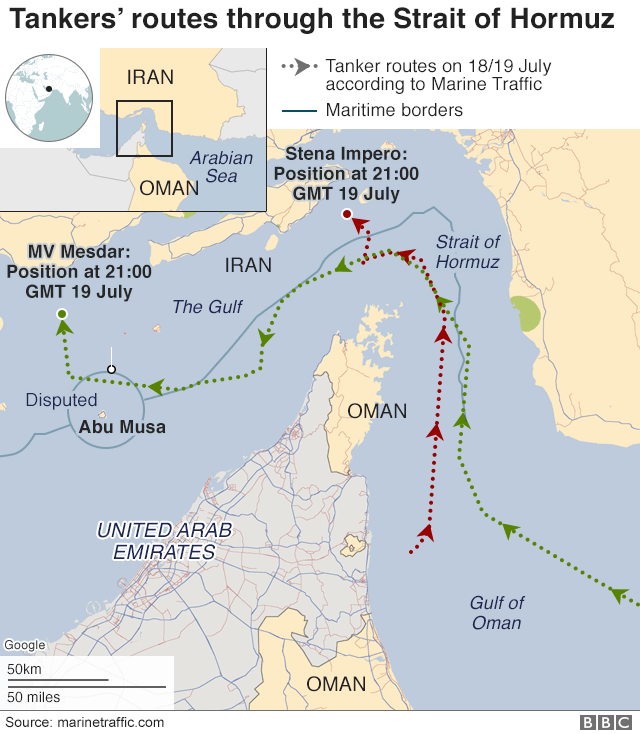


'A predictable crisis'

The first thing to remember is that this specific row between Tehran and London is only one aspect of an already highly volatile situation in the Gulf.
The Trump administration's decision to walk away from the international nuclear deal with Iran and to re-apply sanctions is having a hugely damaging impact on the Iranian economy.
Iran is pushing back.
Given the highly fragile and volatile situation in the Gulf, together with the desperate need to bolster the flagging Iran nuclear deal, was it sensible to detain the vessel carrying Iranian oil off Gibraltar?

How 'British' is the tanker?
Ships must fly the flag of a nation state, explains Richard Meade, managing editor of maritime intelligence publication Lloyd's List.
They must be registered in a country, but that doesn't have to be the same country as its owners, or have any relation to the cargo, he says. But there must be some link to the UK.
"But how you define UK is relative," Mr Meade says.
The Stena Impero is Swedish-owned and those on board are Indian, Russian, Latvian and Filipino.


But it's the UK flag that is important symbolically, he says. "Historically speaking it means that the UK owes protection to the vessel."
"The UK has political responsibilities to anything that is flagged. And that's why it's much more serious than if there just happened to be a British captain on board."
He emphasises that while it was a political issue, the impact on trade in the region had so far been minimal.
But he warns that if the international community began viewing the Strait of Hormuz as a dangerous place to be, that could create a "very different" scenario.

UK faces 'tricky dilemma'

The defence, intelligence and diplomatic figures attending the government's Cobra crisis meetings over Iran are facing a tricky dilemma.
Clearly, British-flagged or owned shipping in the Gulf needs protecting but the Royal Navy does not have enough surface ships to do the job alone.
So this would have to be part of a multinational force like the proposed Operation Sentinel being discussed by US Central Command.
The US Navy has plenty of ships in the Gulf - its powerful 5th Fleet is headquartered in Bahrain - but here lies the problem.
Britain and its EU partners are not on the same page as Washington when it comes to the wider policy of dealing with Iran.
The US has pulled out of the nuclear deal, while Europe is trying to keep it alive.
So there is a reluctance by some on this side of the Atlantic to be identified too closely with a hawkish US posture towards Iran or take any actions that may be interpreted as escalating an already volatile situation.
- Published20 July 2019
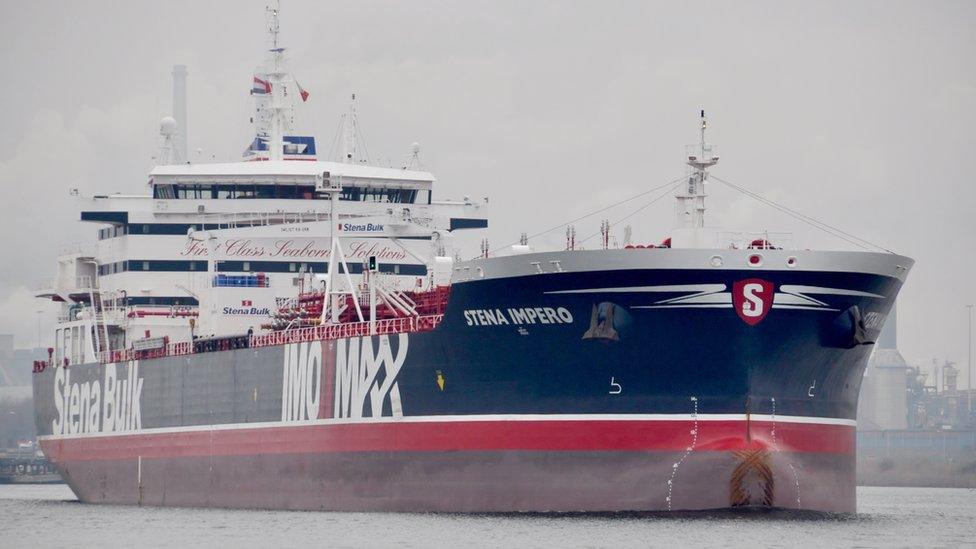
- Published11 June 2019
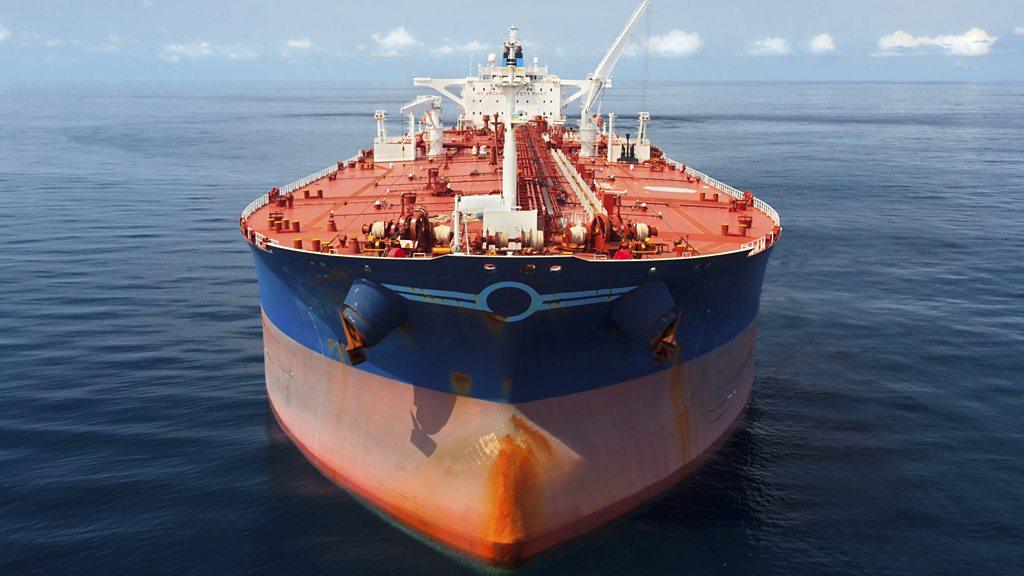
- Published11 July 2019
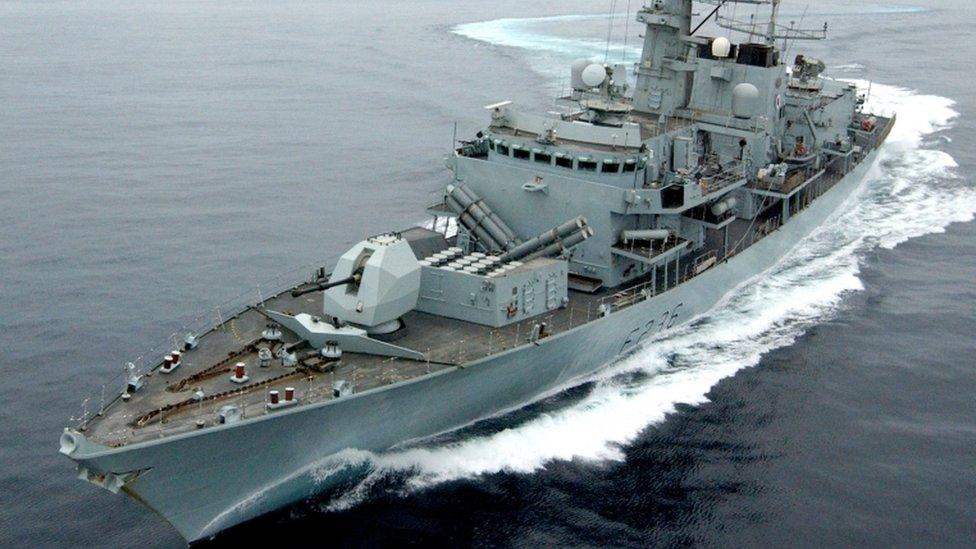
- Published21 June 2019
